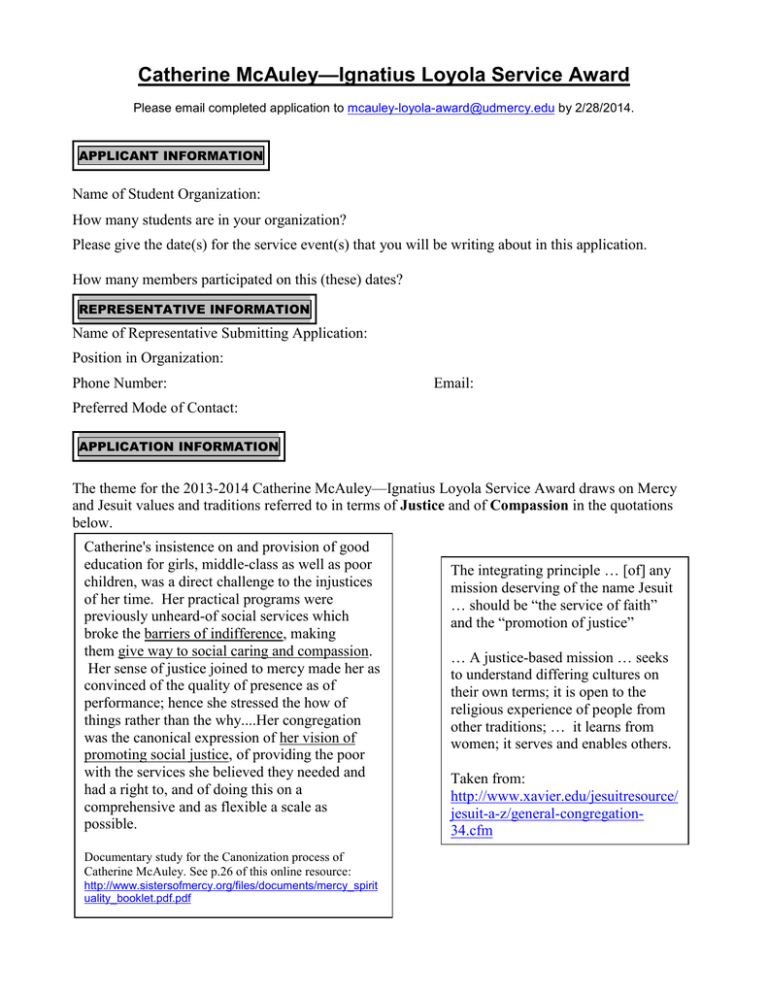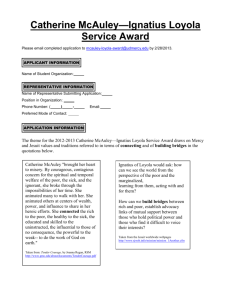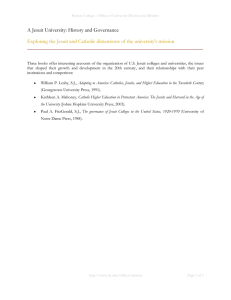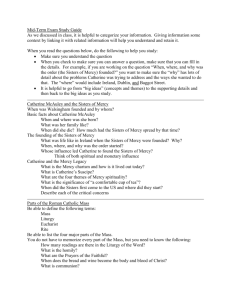—Ignatius Loyola Service Award Catherine McAuley
advertisement

Catherine McAuley—Ignatius Loyola Service Award Please email completed application to mcauley-loyola-award@udmercy.edu by 2/28/2014. APPLICANT INFORMATION Name of Student Organization: How many students are in your organization? Please give the date(s) for the service event(s) that you will be writing about in this application. How many members participated on this (these) dates? REPRESENTATIVE INFORMATION Name of Representative Submitting Application: Position in Organization: Phone Number: Email: Preferred Mode of Contact: APPLICATION INFORMATION The theme for the 2013-2014 Catherine McAuley—Ignatius Loyola Service Award draws on Mercy and Jesuit values and traditions referred to in terms of Justice and of Compassion in the quotations below. Catherine's insistence on and provision of good education for girls, middle-class as well as poor children, was a direct challenge to the injustices of her time. Her practical programs were previously unheard-of social services which broke the barriers of indifference, making them give way to social caring and compassion. Her sense of justice joined to mercy made her as convinced of the quality of presence as of performance; hence she stressed the how of things rather than the why....Her congregation was the canonical expression of her vision of promoting social justice, of providing the poor with the services she believed they needed and had a right to, and of doing this on a comprehensive and as flexible a scale as possible. Documentary study for the Canonization process of Catherine McAuley. See p.26 of this online resource: http://www.sistersofmercy.org/files/documents/mercy_spirit uality_booklet.pdf.pdf The integrating principle … [of] any mission deserving of the name Jesuit … should be “the service of faith” and the “promotion of justice” … A justice-based mission … seeks to understand differing cultures on their own terms; it is open to the religious experience of people from other traditions; … it learns from women; it serves and enables others. Taken from: http://www.xavier.edu/jesuitresource/ jesuit-a-z/general-congregation34.cfm ESSAY ONE Consider the Mercy and Jesuit quotations on page one of these application materials. Then, demonstrate how the service of your student organization exemplifies the Mercy and Jesuit values of Justice and Compassion, by responding to the two questions below in the boxes provided. Limit your responses to a total of 600 words or less (approximately two double-spaced pages.) a. What is (are) the injustice(s) your group engaged while doing service? b. The quote about Catherine McAuley says she “broke down barriers of indifference, making them give way to social caring and compassion.” How does the injustice you engaged in your service lead you (members of your group) to compassion? How did it make you (your members) feel? c. Think about how the Jesuit and Mercy quotes on the first page of these guidelines describe the orientation of these groups toward justice. Then answer this question: How does the service in which your group is engaging affect those most in need? Does your group relate to those in need in a way that is similar to the Jesuits and Sisters of Mercy, or is it different? How so? ESSAY TWO The second is based on three additional values listed in the table below. These are shared by the Mercies and Jesuits as indicated in the left hand column. Spend some time thinking about the questions in the right hand column (labeled “Your Organization”) and write your response in 300 words or less. You do not have to address each question separately, but should indicate some reflection on each of the three areas. Jesuit and Mercy Background Community: As members of religious orders, Sisters of Mercy and Jesuits place particular value on community life. In community we have found that bonds of mutual care animate our common commitment to service. Reflection: St. Ignatius discovered the importance of reflecting on experience. Jesuits and Mercies continue this practice today. Solidarity: Catherine McAuley always strove to bring diverse groups together for mutual benefit. In our Jesuit and Mercy ministries, we have learned to value the formation of mutual relationships with those we serve. Your Organization Community: How does the service carried out by the members of your organization express a common focus or address a common need? How was “community” important in your learning together or growing together from the experience? Reflection: How has reflection been an important part of your organization’s service experience? Give examples of how the reflection helped your group gain the insights that you share. Solidarity: In what ways did you form some bond of mutual respect with the people with whom you worked in your service project? STATEMENT The information provided is accurate to the best of my knowledge. ______________________________________________________ Signature ____________ Date



